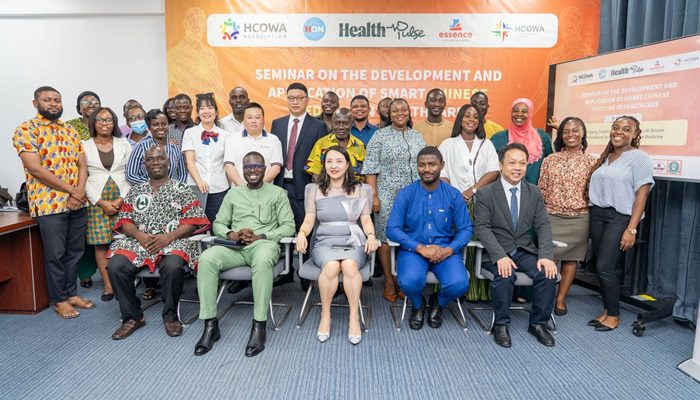In a move to modernize indigenous healthcare systems, the Health Community of West Africa Association (HCOWA) brought together a coalition of traditional medicine stakeholders on Friday, April 4, to discuss the role of Artificial Intelligence (AI) in shaping the future of traditional medical practice across West Africa.
Held under the theme “Bridging Tradition and Technology: AI-Driven Innovations in African and Chinese Medicine,” the seminar focused on real-world AI applications, collaborative research, and policy development to elevate traditional medicine from its grassroots origins into a globally recognized and regulated therapeutic field.
The gathering was attended by key stakeholders, including the Traditional Medicine Practice Council, the Ghana Federation of Traditional Medicine Practitioners Associations (GHAFTRAM), the Ghana Association of Medical Herbalists, Kantanka Herbal Pharmaceuticals and Research Centre, and renowned herbal producers such as Agbeve Herbal, Amen Scientific, Grace Gift Herbal Centre, and Lucky Herbal. During the event, participants engaged in intense discussions on how AI could support clinical decision-making, enable digitized diagnostic systems, and facilitate data-driven herbal drug development.
In her opening remarks, HCOWA President Madam Sihong Jiang issued a rallying call for the modernization of traditional healing practices through technology.
“As technology changes the world, we must ensure that traditional medicine is not left behind. HCOWA believes that AI can make herbal medicine safer, more effective, and more globally recognized. We must explore new ideas, work together, and create a healthcare system that blends the best of traditional healing and modern technology,” she said.
She noted that HCOWA is actively pursuing collaborations that will enable AI systems to be trained using centuries-old herbal knowledge. This includes exploring natural language processing (NLP) for multilingual documentation of medicinal plants, machine learning to analyze pharmacological interactions, and blockchain to secure intellectual property rights for traditional practitioners.
Dr. (MH) Yakubu Tubor Yusuf, the newly-appointed Registrar of the Traditional Medicine Practice Council, lauded HCOWA’s foresight in creating platforms for strategic dialogue and policy alignment. “With the advent of AI, we need to preserve our medicinal heritage through digital storage and smart systems. HCOWA’s leadership is timely, and we intend to complement this effort by investing in herbal drug discovery and formulation research,” he said.
He announced the Council’s plans to collaborate with universities, research institutions, and development partners to push forward an AI-enhanced ecosystem for traditional medicine. Dr. Yusuf noted that over 50 district hospitals in Ghana currently have herbal medicine units integrated into their structures, signaling a strong foundation for broader innovation.
“Our job as regulators is also to differentiate between dedicated practitioners and untrained quacks who tarnish the industry’s image,” he said. “HCOWA’s commitment to quality and collaboration gives us the momentum to create policies that protect the integrity of the field while encouraging investment and research.”
He further advocated for the use of telemedicine to enable licensed traditional practitioners to consult patients beyond borders, supported by e-commerce platforms with clear dosage instructions and real-time feedback systems to track adverse effects and patient outcomes.
Dr. Yusuf further suggested that Ghana explore the potential of telemedicine and digital market platforms to expand the reach of verified traditional practitioners.
“With HCOWA driving this vision, we can establish an e-health system that allows remote consultations, real-time adverse drug reaction reporting, and data-driven patient feedback,” he added.
Kantanka Herbal Pharmaceuticals and Research Centre’s General Manager, Dr. Ohene Kwabena Safo, added to the conversation by demonstrating how AI is already benefiting operations within his organization.
He spoke of smart record systems, AI-powered patient monitoring devices, and even drone delivery services that are transforming herbal healthcare delivery. He also stressed the 3 Ps—Practice, Production, and Professionalism, and how HCOWA’s standardization agenda is central to building public trust and global competitiveness.
Dr. (MH) Sandra Ashong, the President of the Ghana Association of Medical Herbalists and the head of the Complementary and Alternative Medicine Unit at Lekma Hospital, spoke at length about the essential role of innovation within the herbal medicine sector. She acknowledged that the herbal medicine industry encompasses a broad spectrum, including clinical care, research, regulation, cultivation, and manufacturing. However, she emphasized that despite its critical role in healthcare, the industry must evolve and adapt to the ever-changing landscape of medical practice.
Dr. Ashong highlighted that the integration of new technologies, particularly Artificial Intelligence (AI), is crucial for advancing the herbal medicine sector.
She pointed out that AI could bring transformative benefits, not only in improving diagnostic accuracy but also in enhancing the efficacy and safety of herbal treatments. Through AI-driven innovations, herbal medicine can overcome some of the traditional challenges, such as quality control and consistency, and ensure that herbal products meet global standards. This, in turn, can help increase the recognition of African and Chinese herbal medicine on the international stage.
She concluded that HCOWA’s leadership and commitment to fostering research, policy development, and technological integration, traditional medicine is poised for a transformative journey.
By PRINCE OPOKU DOGBEY, Accra
- Armed National Security officers vandalise residence of Bawumia’s aide - 7 April 2025
- Monday, April 7, 2025 Newspaper Headlines - 7 April 2025
- HCOWA unites experts to advance AI in herbal medicine - 6 April 2025




